In its more than 30 years, Perrot Memorial Library's "Young Critics" book club has inspired generations of children.
BookBrowse first spoke to The Young Critics book club in 2008. Kate McClelland, who founded the club 25 years earlier, kindly answered all our questions, providing an inspiring framework for other libraries to follow. Tragically, Kate and her "Young Critics" colleague Kathy Krasniewicz were killed in a car accident a few months later, on their way to the airport after the American Library Association's Winter Convention.
In 2015 we checked back in with the club. This update can be found below the original interview.
2008
Hello Kate, thanks so much for taking the time to chat. First off, how did The Young Critics' Club get started?
Kate McClelland: I started the Young Critics' Club over 25 years ago because all the avid young readers who came to my desk were reading the same handful of titles. I knew that there were dozens of new titles I was purchasing each year that they would love if only they knew about them. Meanwhile they were sitting on the shelves unread.
I also knew that I would never have enough copies of any of the new books (available only in hard cover of course) to have a traditional book club where
everyone reads the same book and discusses it together.
So basically The Young Critics' Club began as my attempt at direct marketing to kids. It was very small to begin with, but the members were always very loyal. We used to close our library at 5pm on summer Fridays, but that rushed the kids checking out their books, so the library began to remain open till 6. When the library was under construction, the YCC kept meeting, even when it meant meeting in library office space. When there was a power outage in an electrical storm, adult services wanted to close the library, but couldn't because the kids wanted to stay and finish talking about their books. Can you tell why I am wired from the minute I jump out of bed on a YCC day?
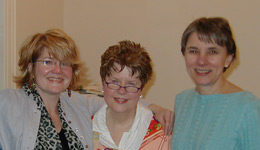
Libba Bray author of the much loved (by boys
and girls alike) "Great and Terrible Beauty",
Kate McClelland and Mary Clark (l
to r)
How do the logistics of the club work?
We meet year round, always on Fridays from 4pm to 5:15pm, twice a month during the school year and every Friday in July. It is a year long reading
commitment because at the end of the school year the members receive a ballot with the titles of the books they have read (usually around 50 titles) and they vote for their top 20 titles.
Mary Clark, who is the Director of Libraries at Greenwich Country Day School, and I lead YCC together. This provides the advantage of having two booktalking voices, two reading points-of-view and twice as many eyes on the hundreds of new books to read each year. At each meeting Mary and I 'booktalk' 3 or 4 new titles. We distribute them to readers who are eager to read them. We usually have 3 or 4 copies of each of these "review books." The review books are then read, brought back to the next meeting, given a star rating (1 to 4 stars, 4 being the top) and a brief review: "this is why I liked it" or "this is why I didn't like it." The books are then handed off to a new round of eager readers.
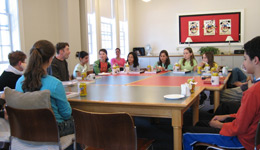
Matthew Skelton had "tea" with early YC readers of
his debut fantasy "Endymion Spring".
I understand that sometimes the publishers send you advanced reading copies of children's books in order to get the club's opinion. Are most of the books that The Young Critics' read provided by publishers ahead of publication?
KM: No. We aim to expose the YCs to all the important new books of the current publishing year. After the awards and notable book lists come out at the end of the year, we often play catch-up to make sure that we haven't overlooked something fabulous.
However, because I have served on many youth book award committees since 1990, I have been sent many books in galley* by publishers. When I read a galley that I think must come to the kids' attention, I usually can ask for a few more copies. Gradually, because of this, marketing people and editors became interested in observing the group. They usually come away impressed, even though they may have heard a scathing review of one of their books.
One thing led to another and now, every so often, we will be requested to "field test" a title like
The Invention of Hugo Cabret or to have the members read a new title and have their discussion videoed for the publisher's sales meeting or to write jacket blurbs for the book. They love to do this, of course. This leads to authors wanting to meet our club members, so the club has the benefit of talking to at least a couple of authors each year. Authors often tell us that they wish they had had this kind of a group when they were kids!
*A galley is a paperback copy of a book published some months ahead of publication for publicity purposes. They are sometimes also known as advanced readers copies or ARCs.
How important to the Young Critics is the fact that they're sometimes reading prepublication books? I ask this because obviously not every school, bookstore or library would be able to do this.
KM: I will say that the main reason kids give for wanting to join is the cachet of reading books before anyone else has the chance to even buy them. However, before I was feeding them all those galleys, they were just as happy with new books… books reserved especially for them. We add a note to our circulation computer system that the card holder is a club member and we do not charge fines for club books. All this makes them feel special, which they are.
How do you decide who reads which books, on the assumption that everyone can't read all of them?
KM: In the course of a year, every kid has a chance to read every book that interests him or her. Every year there are a few who manage to read everything. When we introduce a book, we try to put that book in the hands of a reader who we think will give it a boost up for other readers. Over the years, we get to know their reading preferences and their degree of enthusiasm.
What format do the reviews take?
KM: We keep reviews short and sweet because we don't want to make the process onerous or like homework in any way. The only time we require the club members to write is when they will miss a meeting and have a book to review. Nowadays they email. Their reviews are quick and dirty but passionate. To my delight, they do not always agree… with me or with each other. Interestingly, the readers who read the most and contribute the most enthusiastically to the discussion (I call them the "Leader Readers") receive the most books in trade from their own peers.
How do you decide which books to present to the group?
KM: For every book we introduce to the group, we read anywhere between 6 and 10 that don't make the grade. I promise club members that I will not bring anything that I do not love myself. That way I maintain my credibility. I will admit sometimes I use them as guinea pigs... as the publishers do obviously. But when I get a request from a publisher, I never agree unless I have read the manuscript and think the Critics will like it.
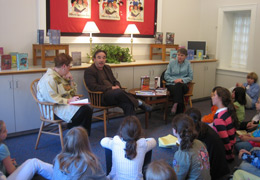
Barry Cunningham publisher of Chicken House
with Kate McClelland and Mary Clark visits the Young Critics.
The YCs were thrilled to meet the "discoverer" of J. K. Rowling!
You mentioned that the club hasn't always been in favor of your choices. How often would you say you've scored a 'miss'? On the other hand, I imagine there are times when you've brought a book to the club that you thought was borderline but the Young Critics have loved it?
KM: That's hard to say, but there are usually three or four books each year that surprise us. This is a big help to us, because as a library with finite shelf space, we do not have room for multiple copies of a highly hyped new book that our readers clearly dislike. We do stress the difference between quality and popularity. By the time YCs get to 8
th grade they have seriously good taste and recognize literary quality and rate it highly.
When you're reading a book for possible recommendation, are you judging it as a book that you personally enjoy at an adult level, or do you put your 'child hat' on and try to consider it from a younger person's point of view? I ask this because I'm sure I'm not the only adult who finds it difficult judging
what will appeal to the children that I choose books for, even though I know their interests well.
KM: You get a "feel" for it over time. I pride myself in reading like a kid. You can never underestimate a couple of things: their impatience with lack of crisp pacing and their lack of historical background knowledge (a 7
th grader once famously asked what the Civil War was). Conversely, you can definitely overestimate their ability to keep track of complex structural elements. Awareness of potential stumbling blocks can be built into booktalks to encourage Critics to keep reading because it will be well worth it in the end.
You've now got two clubs – one for Grades 6-8 and one for Grades 4-5. I believe that the middle school group came first. When and why did you start offering a group for younger readers?
KM: When we opened in a brand new building with new full time staff, we wanted to add services. I asked my very talented assistant at the time, Kathy Krasniewicz, to pick any new program she'd like to run. She wanted to offer a younger clone of YCC which we call The Young Young Critics' Club (Y2C2). We began with grades 3, 4, 5. It just never worked for 3
rd graders. There isn't enough wonderful new literature to support new third grade reading. So we settled on grades 4 & 5. Even so, we only introduce 2 new books at each meeting rather than 3 or 4.
Y2C2 is lead by Kathy Krasniewicz, who is now the Director of Youth Services at Perrot Library, and me. It has become just as popular at its "big sister" club. Kathy has instituted some fun elements which greatly appeal to the younger Y2s, like the twice annual Jeopardy Tournament based upon their knowledge of club books they are reading.
I assume you have been asked about a High School club, is this something you've considered?
KM: I have requests to do a club for high school every year from "graduating" 8
th graders, but I have not tried that yet. The two clubs I do are a LOAD of work, and the reality is that their high school reading commitments overwhelm their free reading time.
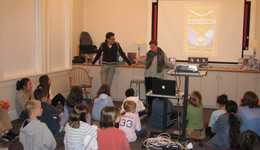
Brian Selznick brought his "Hugo Cabret" slide show
to share and told the YCs he was more nervous about their
early acceptance than he was about early professional reviews.
How many apply to be Young Critics' every year and do you find that you have to turn people away?
KM: From a modest beginning of ten or twelve kids, we now usually have around thirty-five members. We try to take almost everyone
who applies, because we think the application process is self-selecting. They must make the application totally by themselves to prove it was not just the
worthy idea of a parent or teacher hoping to make them a better reader. They have to list their three favorite books (not required reading and not three
books from one series) and be able to talk about why they chose them. Occasionally I will defer an applicant if I think that their reading is not strong enough to support them in this rather high-powered group environment. When and if they reapply, I almost always take them in.
What is the split between the older and younger group, and how many tend to turn up to meetings?
KM: Like YCC, Y2C2 has grown. Now there are about 25 members in the younger group and approximately 35 members in the older group. At any given meeting there are about 5 members missing. Club members have become reliable about letting us know in advance so that their absences will be excused.
What sorts of problems have arisen within the club and how do you deal with them - such a YC failing to bring back a book or opinion about a
book?
KM: These problems just take care of themselves. The kids themselves make the rules. They long ago decided that members who did not bring their books back ready to review would be placed on probation. That means that no one (neither the librarians nor the other club members) is to give them
another book until they bring their review-book back with their review. We have never had to ask a person to leave. If it isn't their thing, they just disappear.
We expect that their library cards will be problematic and filled with overdue books, so, on the theory that they are helping the library build a stronger collection, we forgive fines on club books.
How much interaction do you have with the parents and has it ever been an issue to find the balance between parent-child involvement/responsibility?
KM: Other than being copied on email notification of meetings, we have very little interaction with the parents. This is a very progressive community and only once have we ever had a complaint from a parent, which hugely embarrassed the Young Critic herself. I think parents are just thrilled that their kids are reading books! In a few cases, the kids MAKE their parents read a particular book because they love it so much. That happened with
The Book Thief.
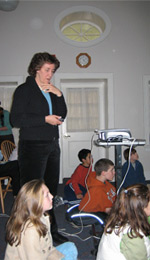
Elizabeth Winthrop shared her deep
research into the historical
background of "Counting on
Grace",
which the YCs loved.
Do the members of the younger club automatically transfer to the middle-school club if they want to?
KM: When a Young Young Critic (5th grader) ages out of our younger group, he/she must reapply for the older group. Acceptance into the older club is based upon their selected titles, their ability to discuss and their previous attendance record in Y2C2. Most, but not all, get in because their background has given them the experience they need to enjoy the older group too.
Do you look for a certain type of reader or are you interested in a wide variety of readers?
KM: Because of the application process, reluctant readers don't usually join YCC. If they have somehow gotten through the application process, they soon drop out.
We are very up front about telling kids we expect them to try all genres. There are some things we avoid like "chick lit" unless it has a lot more to offer than the usual fare (e.g. A Great and Terrible Beauty). During the height of the Harry Potter craze we had lots of boys who applied with nothing but fantasy on their list of favorites, but they all agreed to read all types of books as a condition of membership.
We are totally about the love of books. We are cheerleaders for books, and we invite them to be cheerleaders too. We don't expect a "book report" or an essay. I think that is part of the attraction. Any guidance they get is from other young readers who will try to explain bits that have been confusing. They never make fun of someone who didn't "get" a more challenging book. They are very tolerant as a community of readers. The only thing they have no tolerance for is a person who does not bring his review book back so it can be passed along to other waiting readers.
The group demographics changes over time. A few times in our history we have had more boys than girls. I think the Harry Potter effect has faded, and we are back to being top heavy with girls. I usually tell boys who apply that they will be in the minority. Only once has that discouraged an applicant from joining.
I imagine that the Young Critics' Clubs must become extremely important, even inspiring, to many of these young people (and I bet that many reading this are wishing that something like this had been around for them when they were children!)
KM: It is inspiring, and it is the kids themselves in all their quirky, funny, loud, interruptive glory who inspire. The meetings are highly amusing and
entertaining... like herding the proverbial cats. I feel like I spend way too much time asking them to "hush" so I can hear people speak, but one day I overheard them talking about how they thought club meetings were a party; and I thought, "well, that's cool!"
I once heard a new member telling her mother in the parking lot how thrilled she was because she loved books and none of her friends read so she never had anyone to talk to about her books… they only wanted to talk about TV shows and movies. She said that in one room, for the first time, she met more people to talk to than she'd ever met before in her life!
Your oldest "Young Critic" must be approaching 40 years old at this point – I wonder, do you keep a track of where the children end up in their adult lives?
KM: We always tell the Young Critics that no one ever has to leave and many come back to visit. As you might guess, they are always overrepresented when awards are handed out senior year. We see them on breaks from college when they want to gather up all the YC books and read them ALL over the break. One visited a summer club meeting and gave a booktalk of Carl Hiaason's Flush. At least two have gone into publishing. One became a journalist. One is a librarian who has been very active in the Young Adult Literature community.
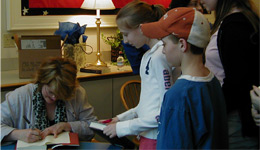
Libba Bray signs copies of "Great and Terrible Beauty" for YCs.
What advice would you offer to other libraries, schools and book stores that might want to start a similar program?
KM: I think anyone could replicate this program. It would have special appeal for schools and libraries that do not have the budget for duplicate copies, which is true of my small independent library.
I think you could easily start a club with 6 members. When we started we had about 10, but there were meetings when we only had 6 attending. But to make sure that the group keeps going and grows:
- Do not try it with the "same old same old" titles.
- Do not make them work hard (after all this is an after school fun
elective).
- Make sure that it is their choice to join by having a screening process
(we once told a child who admitted that he didn't really want to join, that
we would lie to his mom that the group was already full so he wouldn't get
into trouble).
Self-selection is the key: Of the activity and of the books.
Thank you Kate; you, Mary, Kathy and indeed all the staff at Perrot Memorial Library, are truly an inspiration.
2015
In August 2015 BookBrowse checked in with Kathy Jarombek to find out what the club's been up to these past seven years:
We hear that the Young Critics book club has been going from strength to strength these past years. We'd love to know what you've been up to?
KJ: After the accident which killed Kate McClelland and Kathy Krasniewicz, Mary Clark (who had always run the 6th through 8th grade group with Kate) made sure that the groups continued. She and a colleague from the Greenwich Country Day School, Sarah Abercrombie, ran the older group and Jennifer Lau and I ran the younger group. Then I was hired full-time here and continued doing both groups with Mary Clark. Mary retired at the end of April this year and Jennifer Lau came back to help with the older group while Mary Jane Wynne is helping to run the younger group. We feel very proud to have been able to keep these groups going and continue Kate and Kathy's legacy here at Perrot.
It's great to hear that there was such a smooth transition especially in such difficult circumstances. Has there been much change in the way the clubs run?
KJ: Things haven't actually changed that much. Mary ensured that there was continuity in the short term; and all three of us now running the groups knew Kate and Kathy well and understand the philosophy behind the groups so structurally things haven't changed much at all. But we've all run children's groups previously, so bring experiences with us that I'm sure color things. And, of course, there's a whole new generation of children in the clubs now which brings its own subtle changes.
How many are in the groups now?
KJ: There are 31 in the 4th-5th grade group, and 38 in the 6th-8th grade group.
What upcoming books are the Young Critics excited about?
KJ: The continuing success of the group speaks to the Young Critics' dedication to reading and reviewing as many new books as possible in search of each year's best. This summer, the older group has been most excited about The Marvels by Brian Selznick, Nest by Kenneth Oppel and I Am Princess X by Cherie Priest. The younger group has been liking Fuzzy Mud by Louis Sachar and Diary of a Mad Brownie by Bruce Coville. Nick Gannon, the author of the upcoming The Doldrums, stopped by to visit this summer and both groups enjoyed reading his book and hearing him speak. We can't wait to see what the fall brings!
Thanks Kathy, it's been great to catch up!
More about The Young Critics' Club and the Young Young Critics' Club, including recent years' Best Books lists, can be found at perrotlibrary.org/young_critics.htm
See also:
The Dorothy Canfield Fisher Award Book Club and The Feisty Readers Book Club.
Further reading: The Prepub Book Club of Commerce Township, Michigan offers a different spin on a prepub book club.










